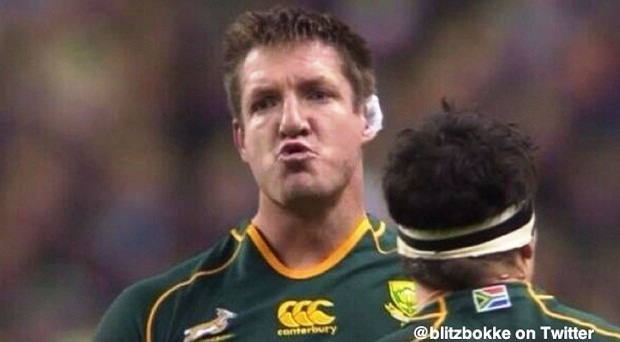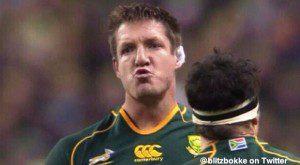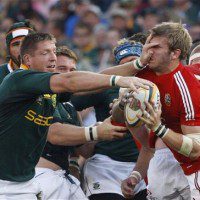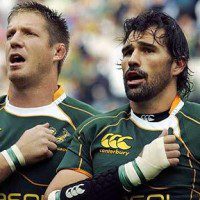

The 35-year-old has enjoyed a rugby renaissance since leaving the Bulls for a new life on the Mediterranean coast after the 2011 World Cup – but he has decided that one more Top 14 season, followed in all likelihood by one more World Cup, will be enough.
“I do have the offer to extend my current contract, but I’ve already made up my mind. This will be my last season as a Toulon player,” he told MyPlayers.co.za.
“My career has been given a new challenge in France, which is refreshing. I’ve had the opportunity to train with and learn from world-class players, like Jonny Wilkinson, Matt Giteau and Carl Hayman.”
So, the opening weekend of the Top 14 season, which kicks off on August 15/16, marks the beginning of a season-long farewell to Bakkies Botha.
Given that it’s probably unwise to argue with one of the hardest men in modern rugby, a player who genuinely lives up to that age-old but rapidly dying rugby role of The Enforcer, let’s instead pay tribute to one of the game’s great modern tough guys.

Talk to a rugby fan over a certain age about the game’s great hard men, and they’ll start talking in awed tones about Wayne Shelford, Jean-Pierre Rives, Peter Winterbottom, Mike Teague, Bobby Windsor and Colin Meads.
Depending on your view, ‘Enforcement’ reached its height, or its depths, during the controversial and utterly brutal British Lions’ tour of Apartheid-ridden South Africa in 1974. Then, Irish harder-than-hardman Willie John McBride introduced a simple code. If the Lions’ players heard him shout “Ninety-Nine”, everyone piled in. Everyone.
It wasn’t pretty. It definitely wasn’t subtle. But – whatever you thought about it and whatever it was intended to achieve – it worked. Occasionally, during the tour, a game of rugby would break out, and it was spectacular. There’s no wonder the 1974 Lions earned themselves the nickname The Invincibles.
Everything has changed in the professional era. It’s no longer enough for a forward to be tough. They have to be athletes and ball-carriers as well. Brain mixed with brawn, mixed with practice and drills. The one-on-one confrontations over 80 minutes that once defined the reputations of the game’s historic hard men have been replaced by training-ground moves involving every player.
But reports of the demise of the rugby ‘Enforcer’ are premature…
Even today there’s a place, maybe even a need, for a team to have at least one player willing and able to take on all comers, who you’d bet the house would still be there swinging away at the end when there’s no one else left standing.
John Philip “Bakkies” Botha has earned his place in the shadowy “Dark Arts” pantheon of those tireless, fearless, professional-era rugby tough guys whose names you whisper quietly lest they hear you and cast their gimlet gaze your way.
Martin Johnson. Paul O’Connell. Julian White. Richie McCaw. Shalk Burger. Danny Grewcock. Jamie Cudmore. Serge Betsen. Nathan Hines. Bakkies Botha.
Botha’s brutal reputation is deserved. He was sin-binned on his South African debut against France for stamping. In 2003, he was banned for eight weeks for “attacking the face” of Australian hooker Brendan Cannon. The authorities couldn’t prove eye-gouging. In April 2009, he was given a three-week ban for walloping Phil Waugh in a Super 14 match.
Two months later, Botha shoulder charged Adam Jones in a ruck during the second Test of the Lions’ tour of South Africa. He earned a two-week ban for a dangerous challenge and left the Welsh prop with a dislocated shoulder. Jones later came out in defence of the South African, saying that he was just “in the wrong place at the wrong time”.
It was, Jones said, a nothing more than a tough-but-fair counter-rucking move from a hard player.
In his first match as Bulls captain in May 2010, he cleared Gio Aplon out of a ruck. The authorities said it was dangerous and banned him for four weeks, meaning he missed the play-offs. And, most notoriously, he was banned for nine weeks from all rugby for head-butting All Black halfback Jimmy Cowan in the first Test of that year’s Tri-Nations. That suspension meant he missed the entire series.
But there’s so much more to Botha than badly concealed, barely controlled violent fury. In no particular order, his trophy haul includes a World Cup title, two Tri-Nations wins, two European Cup titles, three Super 14 winners’ medals, as well as three Currie Cups, and a Top 14 crown.
You don’t win all those just by being a mindless thug. Botha is more than the sum of this part of his game. Much more.

That’s unfair. South Africa coach Heyneke Meyer has persuaded them back into the Springbok fold for one final hurrah for a reason. Not to put too fine a point on it, they are the best of the best playing today – even though they boast a combined age of more than 70.
Yes, Botha has probably deserved (almost) every ban the authorities dished out, but when his career is finally all over – injuries and sanctions permitting at the end of next year’s World Cup – rugby fans will fondly remember the full-blooded, full-bloodied South African who is only just receiving credit he deserves for being an astonishingly good player as well.
That’s it for now. Feel free to comment below, please look for and “Like” our Facebook Rugby Wrap Up Page and follow us on Twitter@ :RugbyWrapUp, Junoir Blaber, Nick Hall, James Harrington, Jamie Wall, Jaime Loyd, DJ Eberle, Cody Kuxmann, Karen Ritter, Jake Frechette and Declan Yeats, respectively.

